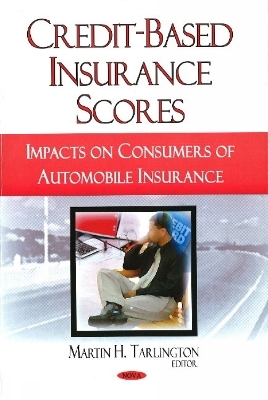
Credit-Based Insurance Scores
Impacts on Consumers of Automobile Insurance
Seiten
2009
Nova Science Publishers Inc (Verlag)
978-1-60692-914-8 (ISBN)
Nova Science Publishers Inc (Verlag)
978-1-60692-914-8 (ISBN)
Section 215 of the FACT Act (FACTA)1 requires the Federal Trade Commission (FTC or the Commission) and the Federal Reserve Board (FRB), in consultation with the Department of Housing and Urban Development, to study whether credit scores and credit-based insurance scores affect the availability and affordability of consumer credit.
Section 215 of the FACT Act (FACTA)1 requires the Federal Trade Commission (FTC or the Commission) and the Federal Reserve Board (FRB), in consultation with the Department of Housing and Urban Development, to study whether credit scores and credit-based insurance scores affect the availability and affordability of consumer credit, as well as automobile and homeowners insurance. FACTA also directs the agencies to assess and report on how these scores are calculated and used; their effects on consumers, specifically their impact on certain groups of consumers, such as low-income consumers, racial and ethnic minority consumers, etc.; and whether alternative scoring models could be developed that would predict risk in a manner comparable to current models but have smaller differences in scores between different groups of consumers. The Commission issues this report to address credit-based insurance scores primarily in the context of automobile insurance. Credit-based insurance scores, like credit scores, are numerical summaries of consumers' credit histories. Credit-based insurance scores typically are calculated using information about past delinquencies or information on the public record (eg: bankruptcies); debt ratios (i.e., how close a consumer is to his or her credit limit); evidence of seeking new credit (e.g., inquiries and new accounts); the length and age of credit history; and the use of certain types of credit (e.g., automobile loans).
Section 215 of the FACT Act (FACTA)1 requires the Federal Trade Commission (FTC or the Commission) and the Federal Reserve Board (FRB), in consultation with the Department of Housing and Urban Development, to study whether credit scores and credit-based insurance scores affect the availability and affordability of consumer credit, as well as automobile and homeowners insurance. FACTA also directs the agencies to assess and report on how these scores are calculated and used; their effects on consumers, specifically their impact on certain groups of consumers, such as low-income consumers, racial and ethnic minority consumers, etc.; and whether alternative scoring models could be developed that would predict risk in a manner comparable to current models but have smaller differences in scores between different groups of consumers. The Commission issues this report to address credit-based insurance scores primarily in the context of automobile insurance. Credit-based insurance scores, like credit scores, are numerical summaries of consumers' credit histories. Credit-based insurance scores typically are calculated using information about past delinquencies or information on the public record (eg: bankruptcies); debt ratios (i.e., how close a consumer is to his or her credit limit); evidence of seeking new credit (e.g., inquiries and new accounts); the length and age of credit history; and the use of certain types of credit (e.g., automobile loans).
Preface; Introduction; Development and Use of Credit-Based Insurance Scores; The Relationship Between Credit History and Risk; Effect of Credit-Based Insurance Scores on Price and Availability; Effects of Scores on Protected Classes of Consumers; Alternate Scoring Models; Conclusion; Index.
| Zusatzinfo | Illustrations |
|---|---|
| Verlagsort | New York |
| Sprache | englisch |
| Maße | 260 x 180 mm |
| Gewicht | 508 g |
| Themenwelt | Recht / Steuern ► EU / Internationales Recht |
| Recht / Steuern ► Wirtschaftsrecht ► Bank- und Kapitalmarktrecht | |
| Betriebswirtschaft / Management ► Spezielle Betriebswirtschaftslehre ► Versicherungsbetriebslehre | |
| ISBN-10 | 1-60692-914-3 / 1606929143 |
| ISBN-13 | 978-1-60692-914-8 / 9781606929148 |
| Zustand | Neuware |
| Haben Sie eine Frage zum Produkt? |
Mehr entdecken
aus dem Bereich
aus dem Bereich
Bedarfsanalyse, Vertrags-Check, Testsieger für jede Situation, …
Buch | Softcover (2024)
Stiftung Warentest (Verlag)
CHF 20,95


